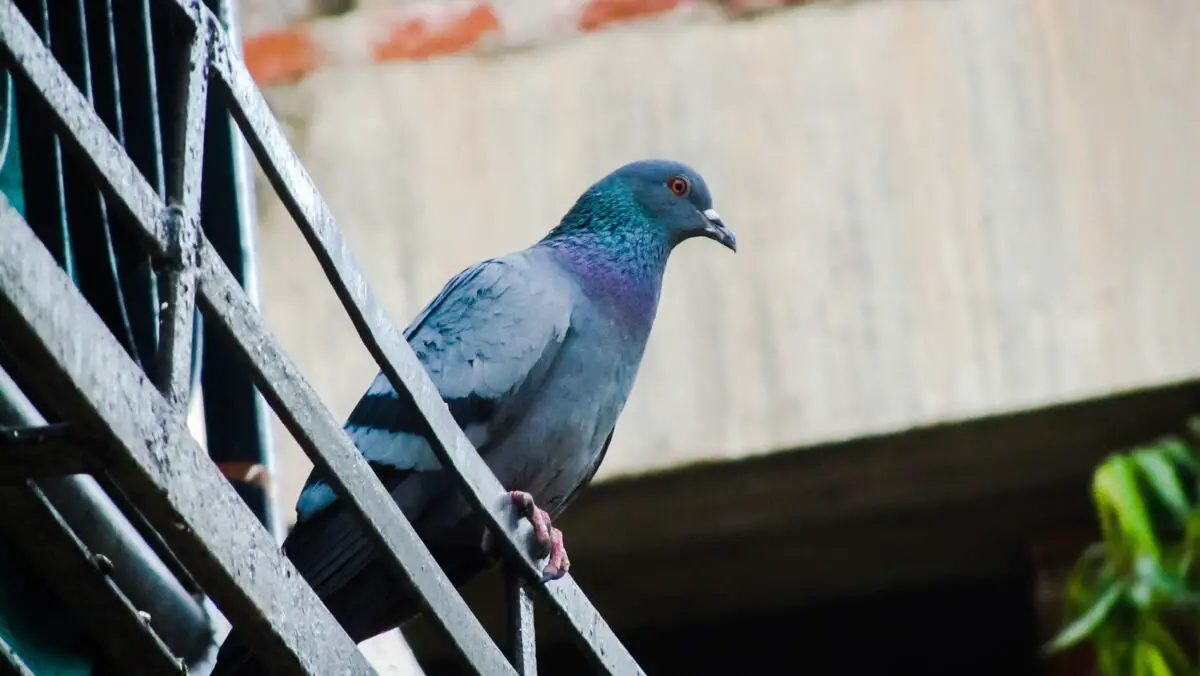Pigeons are often attracted to apartment balconies and ledges since those structures appear similar to the bird’s natural habitat of tall rocky cliffs. However, they often leave pounds of droppings, which can be tough to clean. Their feces can also attract flies and other vermin, besides causing property damage due to the caustic nature of the droppings.
To keep pigeons off a balcony, you can apply numerous humane approaches to dealing with pigeons, ranging from simply keeping things tidy to more complex ways such as using pigeon netting.
This guide will solve your bird-poop problem without harming the bird. Read on to follow, starting with simple strategies before trying out more complex options.
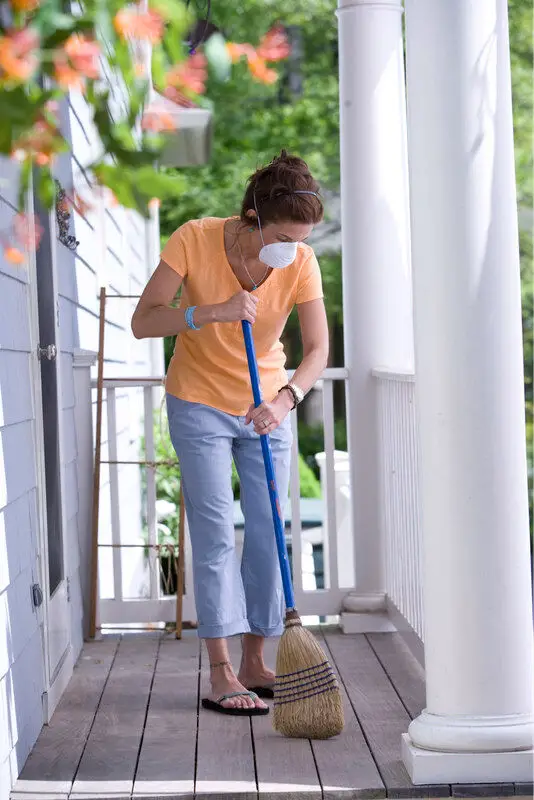
Keep Your Balcony Tidy
How do you keep pigeons away naturally?
Simply by keeping things tidy.
But it doesn’t mean that pigeons like dirty places. They are just looking out for places where they can easily get nesting material and hide from potential predators.
Therefore, you should remove anything that the birds can use as nesting material. Or simply keep the entire balcony thoroughly clean. If you recently ate on your balcony, clean out all the food.
Also, avoid the habit of storing items on your balcony.
That barbecue grill that you’ve stored there for weeks could be the perfect hiding spot for pigeons. You might also have to remove the furniture which can provide shelter to those birds.
While you’re at it, also clean up the pigeon poop.
Don’t let any poop stay on too long. Clean it out as soon as you find it. For large accumulations, you may need a face mask and gloves.
Spritz old and dry feces with water to prevent dust before cleaning.
After cleaning, spray wood, concrete, or other hard surfaces with a 10% bleach solution. Alternatively, steam-cleaning will work just as well to eliminate residual microorganisms.
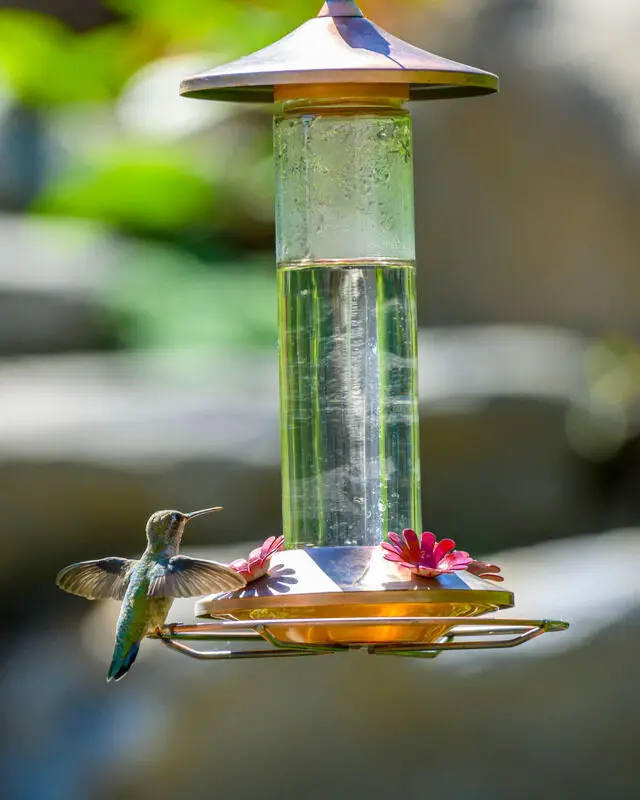
Remove Bird Feeders
If you have a bird feeder, you may have to remove it for a while in order to deal with your pigeon problem.
Pigeons are attracted to food, so look around your neighborhood to see if anyone else is feeding the birds. You can explain the problem you have with such birds to your neighbors, and they may agree to remove their bird feeders.
In case someone is feeding pigeons on public property, you would have more control over the situation. Feeding wildlife on public property is illegal in various cities. Therefore, if the person feeding those pigeons doesn’t agree to stop doing it, you can report it to the regulatory authorities.
When the pigeons can’t find any food, nesting material, or hiding places, they’ll likely move on to other places.

Sit or Stand on Your Balcony Regularly
Pigeons hate the presence of potential predators.
Since humans are potential predators, you can use that against them simply by using your balcony frequently.
The birds often build their nests when no one is around. So, the more time you spend on your balcony, the less likely they are to come around. Consider working on your balcony to be more productive and keep the pigeons away at the same time.
Unfortunately, you may not be around too often. In which case, you can try out the next option.
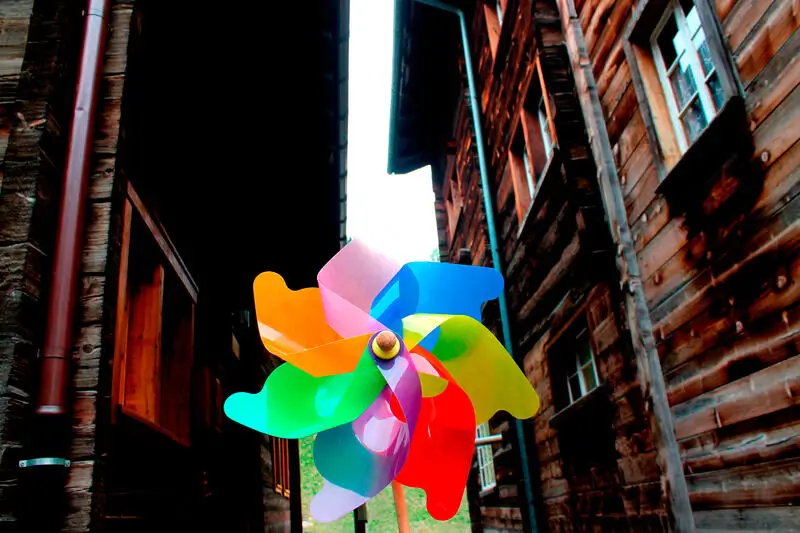
Add a Visual Deterrent (Shiny Paper, Old CDs, etc.)
Visual deterrents are pretty effective in scaring away pigeons, especially if you’re not around.
The visual deterrents need to be objects that move randomly, propelled by the wind. You’ll also need to move it around regularly, or even change it once in a while.
Several useful objects include:
- Strips of shiny wrapping paper
- Old CDs hanging on a string
- Colorful spinning pinwheels
These solutions are not only cheap and easy but also work automatically without your input.
Take note that stationary objects like plastic owls won’t work on pigeons.
Add Wire or Fishing Line Above the Railing
If you can’t scare the pigeons away, you can at least keep them from perching.
When they can’t perch, they’ll soon leave.
The best perching spots that pigeons love are railings of their nest-site balcony. They use this spot to look around for any nearby predators.
Once you find such a spot, get a piece of wire or a heavy gauge fishing line. Secure this wire or line, about 2-3 inches (5-8cm) above and parallel to the railing. Make sure it’s tight enough by tying it to screws or nails on both ends.
Since pigeons aren’t technically perching birds, they’ll have a hard time standing on such a thin wire.
If you don’t have any wire or fishing line, you can buy commercial flexible pigeon wires and coils. However, they might be costly to install.
Use Pigeon Netting
Completely netting in your balcony is even more effective.
For the best results, get it installed professionally and maintain it properly.
If not properly installed, the net can be dangerous to pigeons, as well as other birds like sparrows, and hawks. The birds may get tangled up when flying into the net. And you definitely don’t want to deal with dead birds on your balcony.
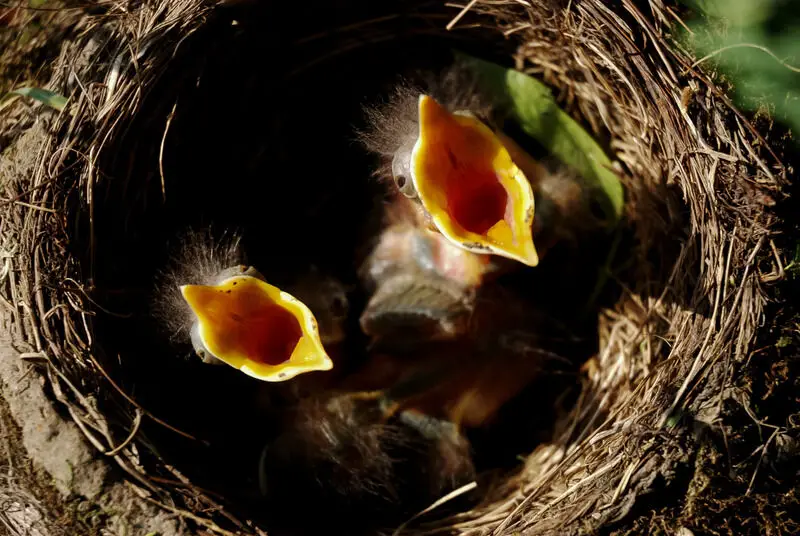
Remove Eggs Before One Week
You might have gone on a short vacation and came back to find pigeons having laid eggs on your balcony.
In this case, you need to take action fast before things get out of hand.
If the eggs were laid less than a week ago, you could dispose of them. Take them to your local park and hide them under a bush. It’s only sensible to put the eggs back into the natural cycle.
Unfortunately, if the eggs are more than two weeks old, the humane way to handle it is letting the parents raise their brood. But it won’t take too long before the eggs hatch and the babies grow up.
Pigeons incubate their eggs for about three weeks, and the babies grow up within four weeks.
Remove Nest After Baby Pigeons Grow
At times, you may only realize that you have a pigeon problem when the birds already have a family on your balcony.
At this point, you need to do two things:
- Wait for the birds to grow up
- Prevent the pigeons from laying more eggs
Within four weeks, baby pigeons will be all grown up and fly away, leaving you in peace. What’s even better is the babies won’t come back to that nest again.
“But, can’t I just move the nest?”
Don’t do it. Pigeons are very location-specific about their nest site. The parents may abandon the nest if you move it even a few feet. This will lead to the death of the baby pigeons since they cannot survive without their parents.
While you wait for the baby pigeons to fly off, always keep the surrounding area tidy. This prevents the parents from starting another nest nearby. They can do that even before the first babies fly off.
Do Not Harm the Pigeons
There are certain things you shouldn’t do as you try to keep pigeons off your balcony.
The most important thing you should observe is not to harm the bird. Depending on your specific state legislation and the particular pigeon species, harming the pigeons may be illegal. Therefore, don’t try using anything to hit the birds.
That also means that you shouldn’t use commercial gel-repellants. The gel will make your balcony surface sticky, which can be harmful to pigeons and other birds.
Similarly, you shouldn’t place poisonous food on your balcony to kill the birds.
Conclusion
Having such a wide array of options to get rid of pigeons can help you figure out the most suitable one for your particular situation. It’s always best to first try out the less demanding options, which are less likely to harm the birds.

